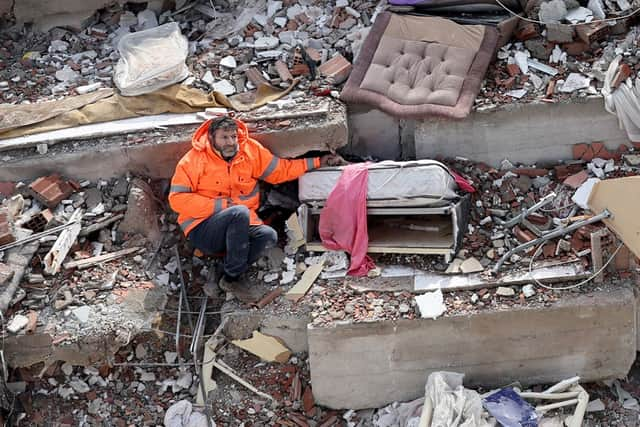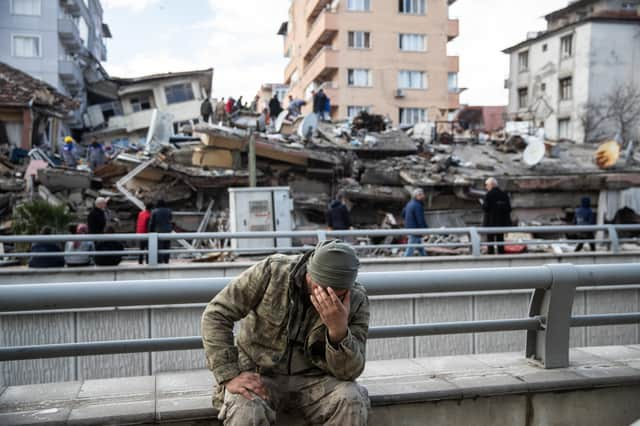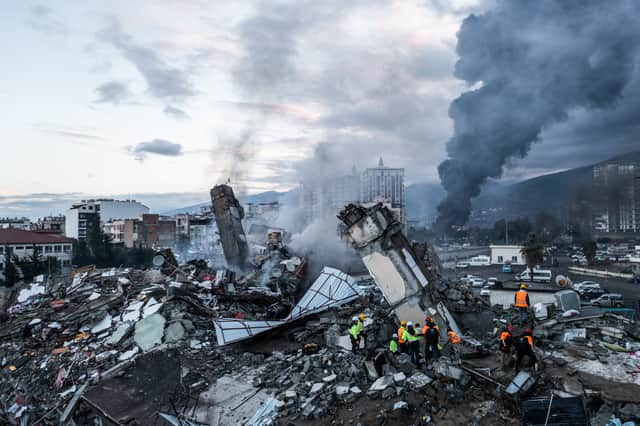What is the death toll in Turkey and Syria? Number killed in earthquakes rises to 36,000
and live on Freeview channel 276
More than one week after the devastating earthquake hit parts of Turkey and Syria, surivors are still being found amongst the rubble.
The death toll resulting from the event has now reached to almost 36,000 people. The latest numbers come as search teams have been warned that the window to find survivors is rapidly deteriorating.
Advertisement
Hide AdAdvertisement
Hide AdHowever, Turkish television stations have continued to show search teams pulling survivors from the rubble. Some were found alive at least 198 hours after the earthquake first hit.
The US Geological Survey measured the first quake at 7.8, with a depth of 11 miles. Hours later, a 7.5 magnitude tremor, likely triggered by the first, struck more than 60 miles away. In the Turkish city of Gaziantep, a provincial capital about 20 miles from the epicentre, people took refuge in shopping malls, stadiums, mosques and community centres.
While stories of miraculous rescues days on from the disaster have briefly buoyed spirits, the grim reality of the hardship facing tens of thousands who survived the disaster cast a shadow. Attention has turned to aid and support for survivors, with President Assad of Syria green-lighting new entry points for aid to come through the border.
Tens of thousands are thought to have lost their homes. In Antakya, former residents of a collapsed building huddled around an outdoor fire overnight into Thursday, wrapping blankets tightly around themselves to try and stay warm. Freezing temperatures are causing a “secondary disaster” aid agencies said, with many survivors to afraid to go inside buildings.
Advertisement
Hide AdAdvertisement
Hide AdInternational Rescue Corps operational director Rob Barrie - who worked to save people after Turkey’s deadly 1999 earthquakes - told NationalWorld: “The first 24 hours are vital, but rescue work will continue as long as needed.” He said he had previously found children still alive days later.


Turkish authorities said that more than 41,500 building have been either destroyed or so badly damaged that they will need to be torn down. Hospitals were damaged, and one collapsed in the city of Iskenderun. The second quake caused a multi-storey apartment building in the Turkish city of Sanliurfa to topple onto the street in a cloud of dust as bystanders screamed, according to video of the scene.
Serap Arslan said many people remain under the rubble of the nearby building, including her mother and brother. She said machinery only started to move some of the heavy concrete. “We tried to clear the debris on our own, but unfortunately our efforts have been insufficient,” the 45-year-old said.
Selen Ekimen wiped tears from her face with gloved hands as she said both her parents and brother are still buried. “There’s been no sound from them for days,” she said. “Nothing.”


What is the latest death toll?
Advertisement
Hide AdAdvertisement
Hide AdThe death toll from the catastrophe rose to almost 36,000 on 14 February. The new figure, which is certain to rise, includes more than 31,643 people in Turkey and 3,580 in civil war-torn Syria, with tens of thousands of people were also injured.
The Syrian Health Ministry in Damascus said that 1,414 people had died in government-controlled areas. Data from rebel-held areas of Syria has been harder to verify however rescue group White Helmets said that it believed the detah toll in the rebel-held areas currently stands at 2,166.
Loading....
The quake, which was centred in Turkey’s south-eastern province of Kahramanmaras, sent people in Damascus and Beirut rushing into the street and was felt as far away as Cairo in Egypt. Here is a map of the affected region where the quakes struck.


How has the world responded?
Teams from nearly 30 countries around the world headed for Turkey or Syria. As promises of help flooded in, Turkey said it would only allow vehicles carrying aid to enter the worst-hit provinces of Kahramanmaras, Adiyaman and Hatay in order to speed the effort.


Advertisement
Hide AdAdvertisement
Hide AdThe United Nations (UN) previously said it was “exploring all avenues” to get supplies to rebel-held north-western Syria, where millions live in extreme poverty and rely on humanitarian aid to survive.
Syrian president Bashar al-Assad has now given the go-ahead for UN aid to be passed over the border and delivered in greater volume. The only previous entry point was located at Bab al-Hawa in the rebel-held region of Idlib - new entry points at Bab al-Salam and Al Ra’ee in north-west Syria have will remain open for three months.
Saudi Arabia has raised $50million dollar in aid for Turkey and Syria. Other Arab countries such as United Arab Emirates, Jordan and Egypt have also delivered aid to the government-held regions of Syria.
Turkish people have applauded the reaction of those living in the UK who “swarmed” to donate thousands of pounds and hundreds of boxes of humanitarian aid in the days after a devastating earthquake in Turkey and Syria.


Advertisement
Hide AdAdvertisement
Hide AdA spokesman for the British Turkish Association, based in Luton, said on Tuesday the reaction of “all communities” in London has been “emotional” as the death toll in Turkey surpasses 5,000 and the worldwide donation amount on fundraising site JustGiving exceeded £750,000 in one day.
Atilla Ustun, 55, said: “What we’ve seen in the last 24 hours (is) that the Turkish citizens in the UK are just absolutely amazing. All the communities in Luton and around have swarmed to donate… Just locally, in Luton itself, we’ve raised around £20,000 but we know that in general, I think in London it’s now between £200,000-300,000.


“I think it’s just a human reaction in every sort of disaster around the world. Unfortunately it has happened in (the) south-east of Turkey. It is very emotional when this sort of thing happens… The actual size of the disaster is very, very large indeed so we help as much as possible.”
Comment Guidelines
National World encourages reader discussion on our stories. User feedback, insights and back-and-forth exchanges add a rich layer of context to reporting. Please review our Community Guidelines before commenting.